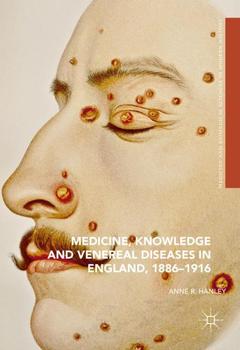Description
Medicine, Knowledge and Venereal Diseases in England, 1886-1916, Softcover reprint of the original 1st ed. 2017
Medicine and Biomedical Sciences in Modern History Series
Author: Hanley Anne R.
Language: English
Subjects for Medicine, Knowledge and Venereal Diseases in England...:
Publication date: 11-2016
Support: Print on demand
Publication date: 06-2018
Support: Print on demand
Description
/li>Contents
/li>Biography
/li>Comment
/li>
This book reveals the ever-present challenges of patient care at the forefront of medical knowledge. Syphilis and gonorrhoea played upon the public imagination in Victorian and Edwardian England, inspiring fascination and fear. Seemingly inextricable from the other great 'social evil', prostitution, these diseases represented contamination, both physical and moral. They infiltrated respectable homes and brought terrible suffering and stigma to those afflicted. Medicine, Knowledge and Venereal Diseases takes us back to an age before penicillin and the NHS, when developments in pathology, symptomology and aetiology were transforming clinical practice. This is the first book to examine systematically how doctors, nurses and midwives grappled with new ideas and laboratory-based technologies in their fight against venereal diseases in voluntary hospitals, general practice and Poor Law institutions. It opens up new perspectives on what made competent and safe medical professionals;how these standards changed over time; and how changing attitudes and expectations affected the medical authority and autonomy of different professional groups.
Anne Hanley is a Junior Research Fellow at the University of Oxford. After completing her PhD in History at the University of Cambridge, she worked with the Centre for History and Philosophy of Science and the Museum of the History of Science, Technology and Medicine at the University of Leeds. Her research interests are in the social history of medicine and healthcare during the nineteenth and twentieth centuries, along with closely related themes in gender, political and economic history. She has published on the history of infertility, midwifery, medical education and nineteenth-century clinical experimentation.




